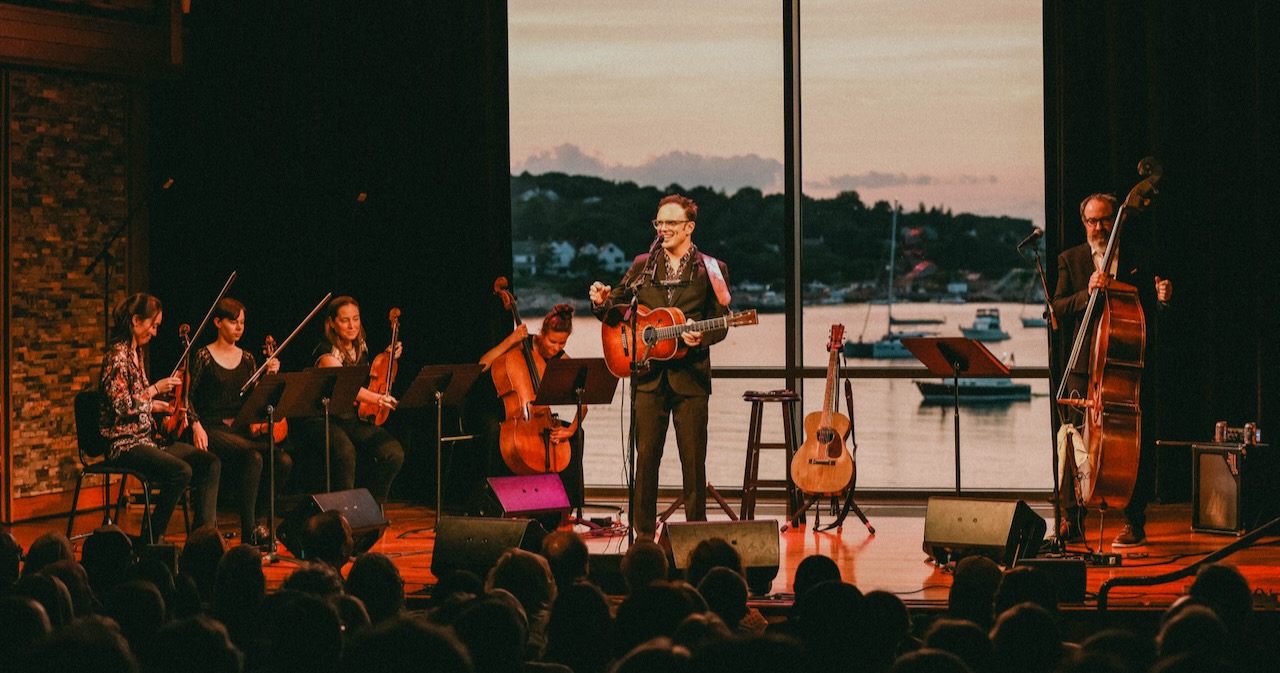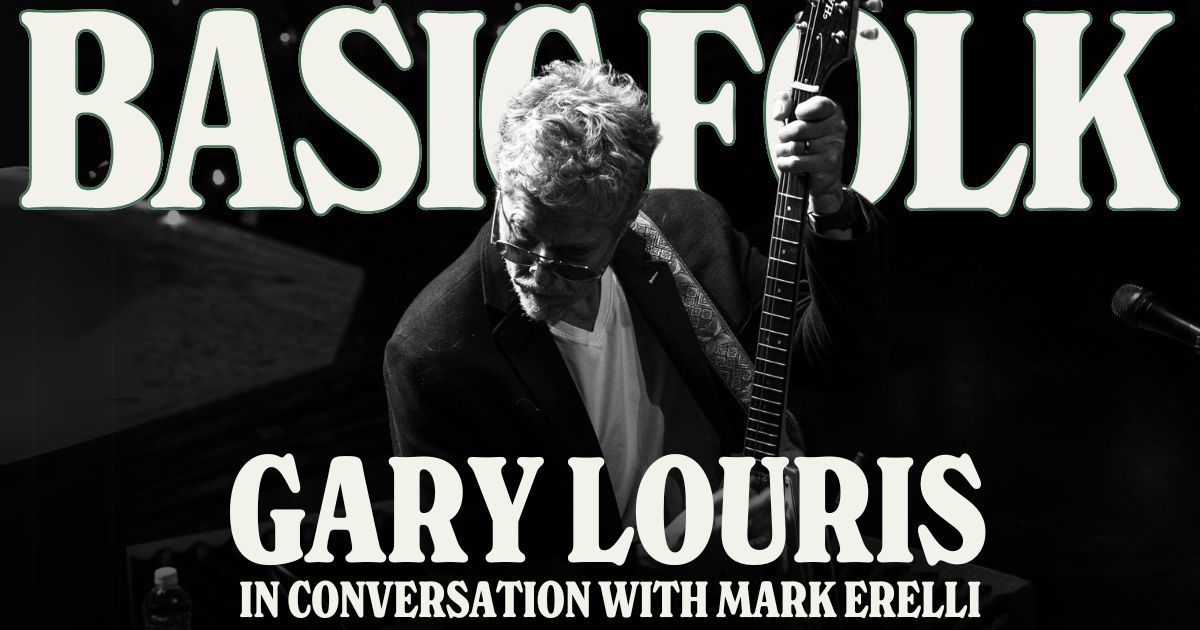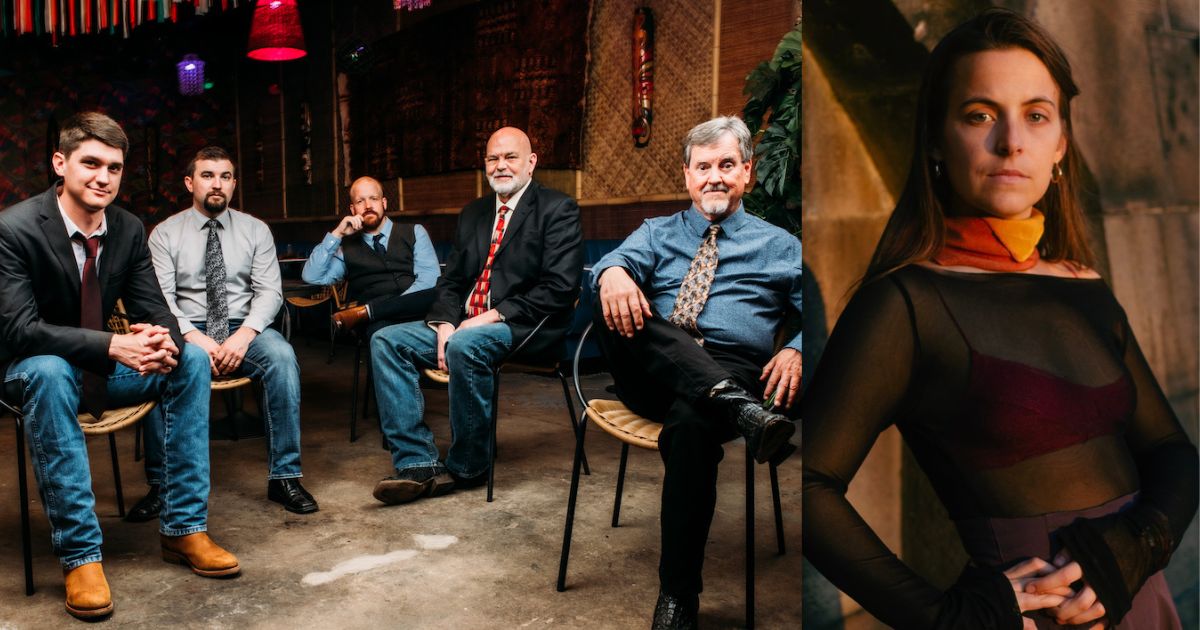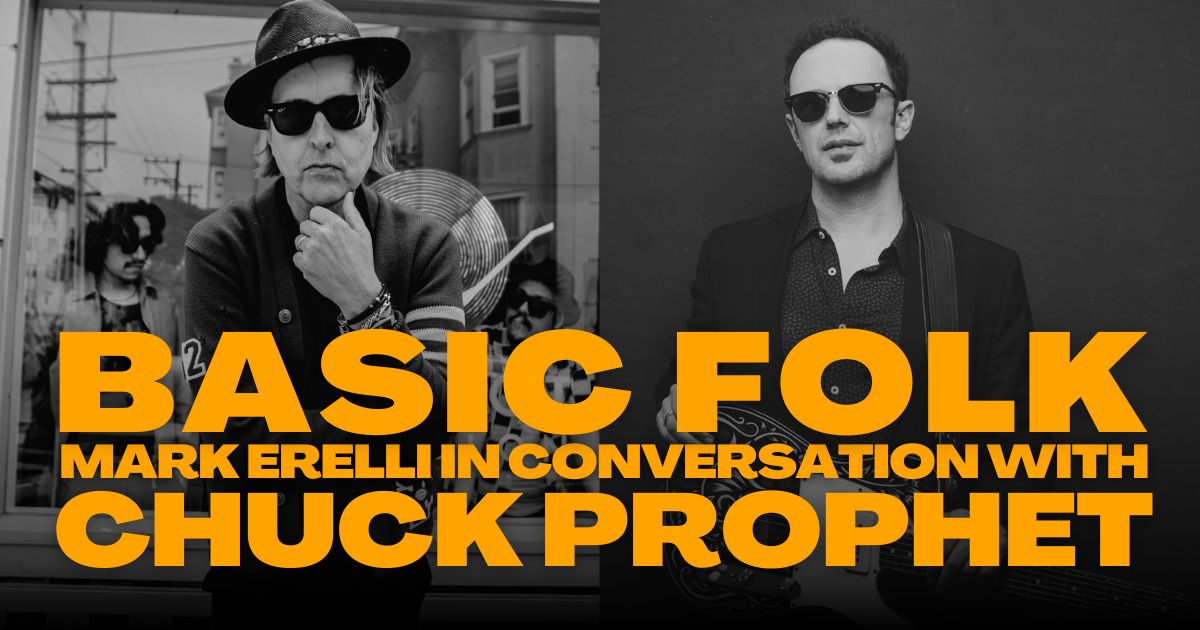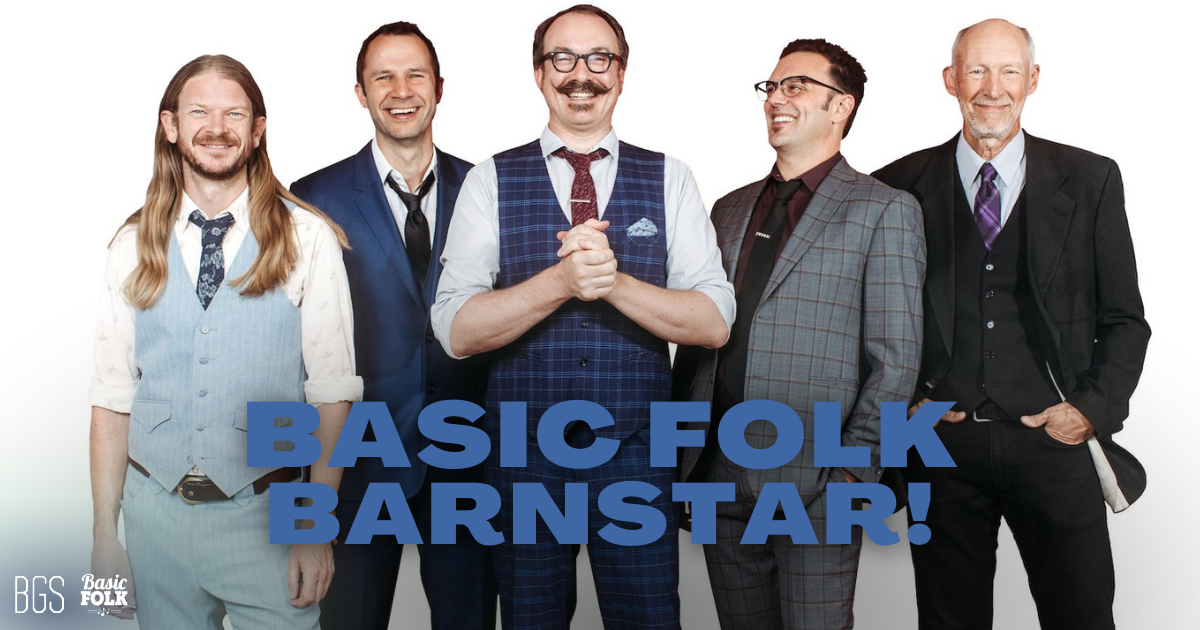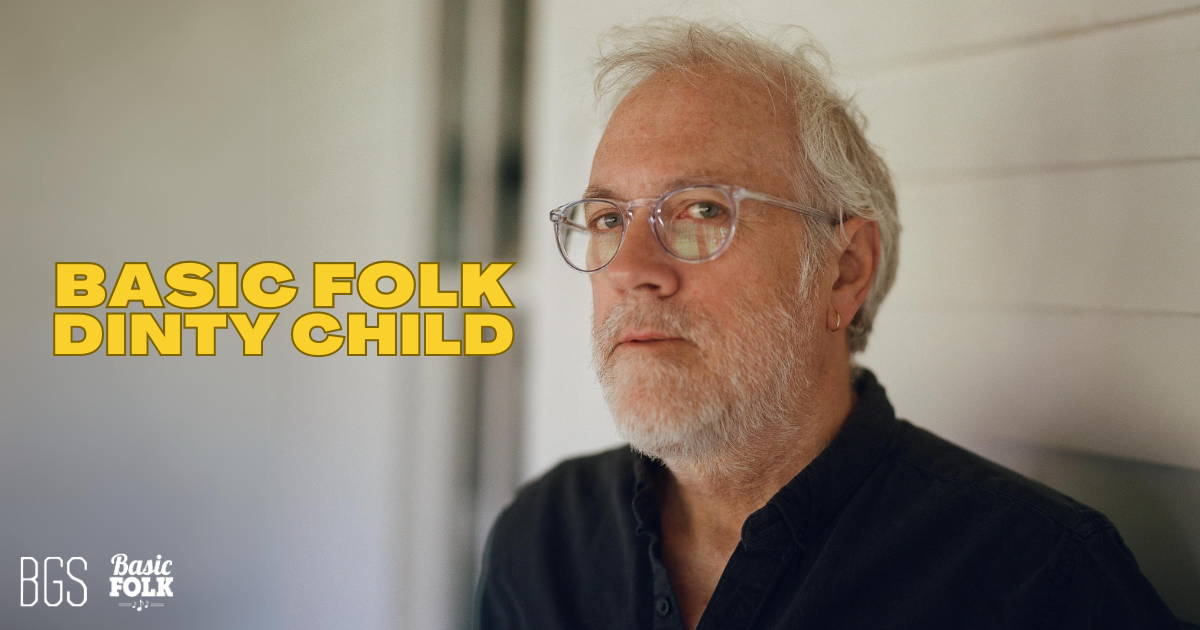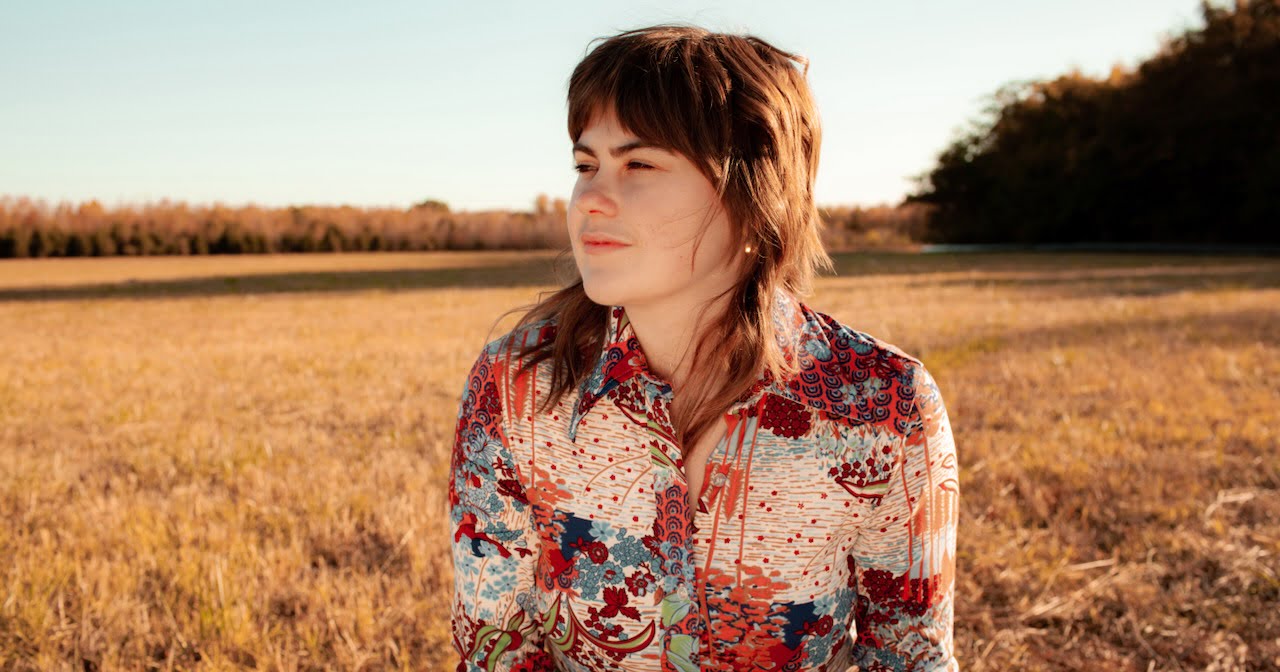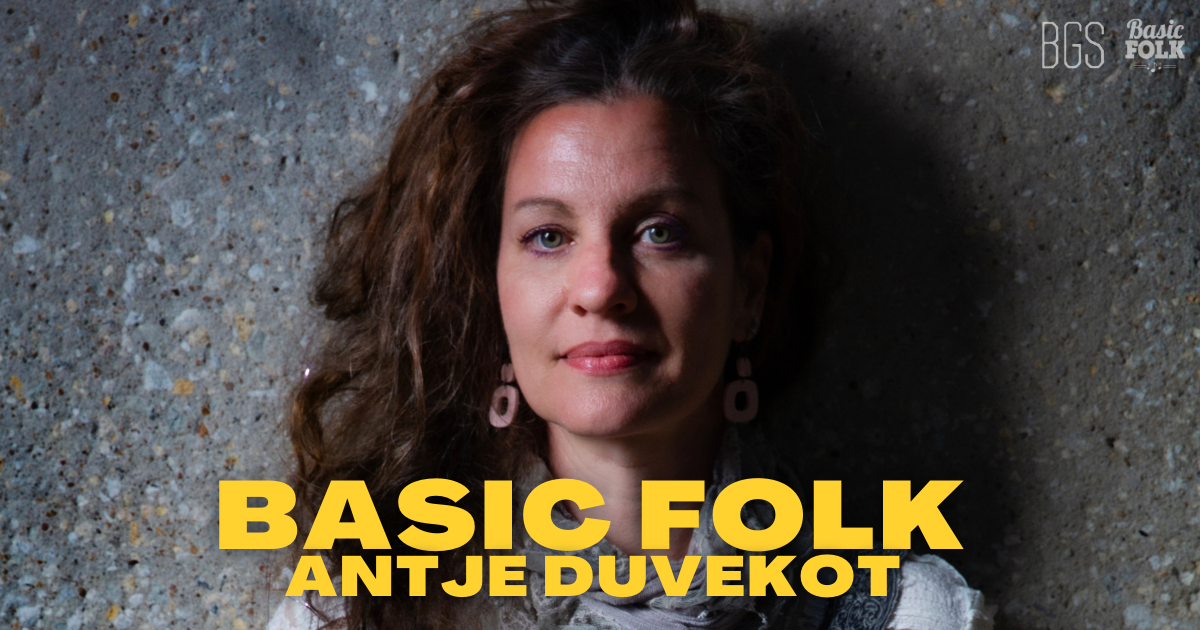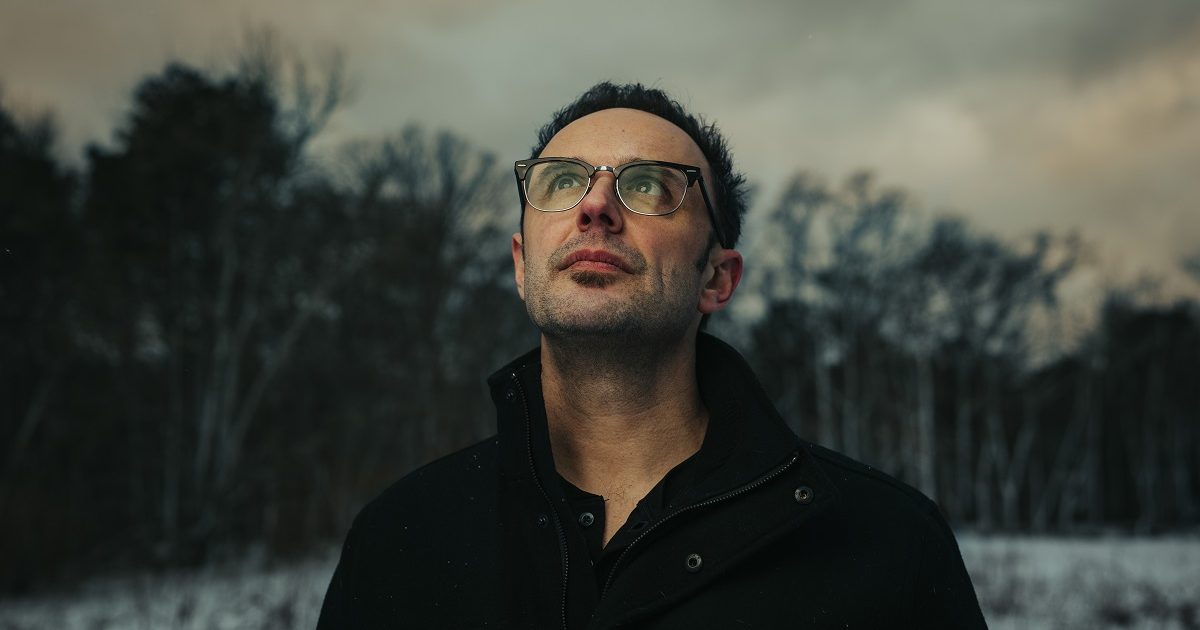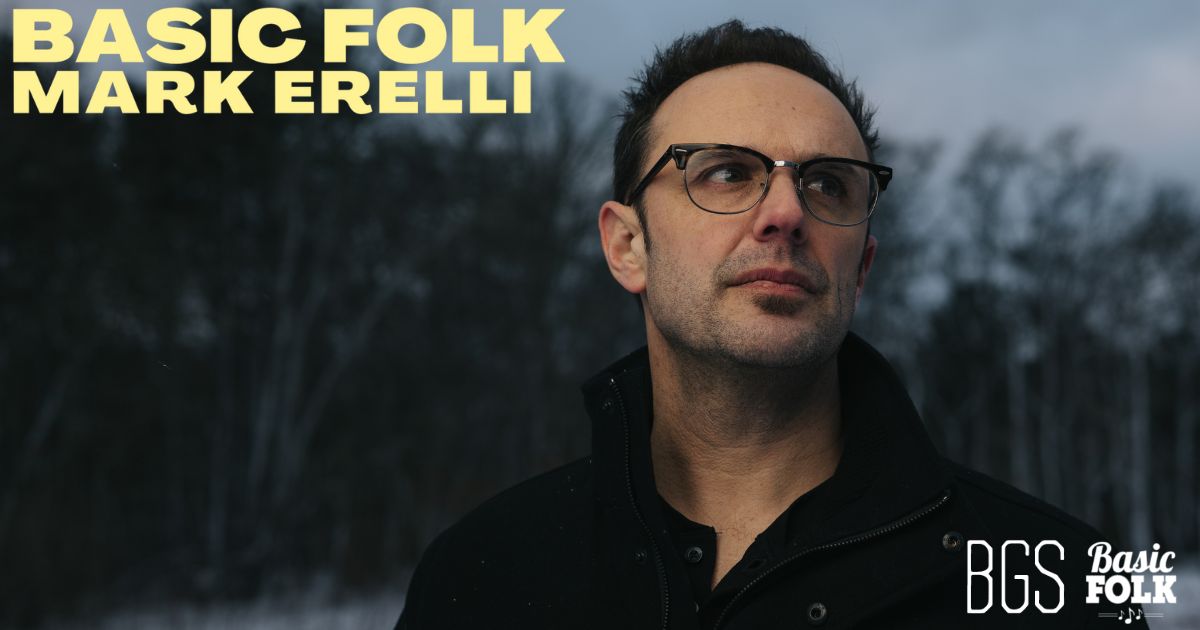Just as spring began its soft awakening here in the Northeast, Mark Erelli breathed new life into his vast catalog with the release of Live in Rockport: Mark Erelli & His String Quintet. As if his 13 solo albums, three bluegrass albums, and a considerable list of collaborations weren’t extensive enough, Erelli’s newest album forages entirely novel innovations.
With the help of longtime collaborator Zachariah Hickman (bass, vocals, arrangements), Erelli dispenses a selection of nine songs from throughout his decades-long vault of material with an imaginative twist – each has been delicately rearranged for Erelli, his guitar, and a string quintet. Recorded live in the sonically apt Shalin Liu Performance Center of Rockport, Massachusetts, the painstakingly intricate layers of strings weave a dynamic backdrop for Erelli’s potent songsmanship.
Cinematic and profound, the resulting tracklist examines these illustrious songs through new textures and colors. With deep attunement to both past iterations and new arrangements, listeners are struck by the simultaneously transient and perpetual nature of a good song.
BGS had the pleasure of chatting with Mark Erelli about the musings and process behind his newest creation.
So tell me about what the inception of this project was like – what propelled you to make a live album with a string quintet?
Mark Erelli: I’ve wanted to make a live record for years. And the question for any artist is always, “When do you do it?” If you do it too early in your career, you don’t maybe have as much experience performing live and you’re maybe not at the height of your powers. Yet, if you do it when it’s been a long time between records, it can seem almost like an afterthought. So I’ve always wanted to do it, but I’ve really struggled with the “when” of it. And then I’ve also grappled with what the format should be, because I perform in a lot of different formats, but I think my native performance format is still as a solo acoustic singer-songwriter.
I’ve thought about doing that live since I don’t have any records where it’s just me and my guitar. I’ve actually tried to professionally record live shows, but I never really captured a show that felt magical, and that’s the thing about live performance, right? It’s such an ephemeral thing, that’s the beauty of it, and that’s the frustrating thing if you’re trying to capture it. As I got further and further in my career, I realized I didn’t want to do the kind of live record that is just a snapshot of me on a normal night. I decided if I was going to do it, I wanted to make something really special and I wanted it to be a classic moment that really transforms how you think about an artist.
One of my favorite live albums is At Fillmore East by the Allman Brothers Band – it’s a high bar to measure yourself against, but I really wanted a live album that showcased my work in a new light. That’s where the string quintet came in. I had worked with strings on my most recent three records or so and I started working with strings on my covers record in 2018 called Mixtape. Strings are such a novel, fun, really amazing element to be able to work with – they’re quite the extra color to paint with, but I always had used them in the context of a band performance, tracking the strings after to support and augment the band.
I started wondering, what would it sound like if the strings just were the band? I got the chance to figure this out when I re-released my debut record on its 25th anniversary and I re-recorded one of the songs with a string quintet. That’s when I realized, “Oh yeah, this is gonna work out great, we’ve got to find a way to document this.” We made the live record shortly thereafter.
What do you think changes about the music and the material when you intentionalize the context and the sound like this?
Strings are really unique in that they can support a very wide dynamic range. For example, if you’re playing with a rock band, it’s pretty easy to get and you can only really get so quiet. The drums can only be so quiet. Electric guitars can only be so quiet. But the strings can get as loud and as percussive as stirring as a rock band. There’s this extra part of the dynamic range at the lower end of the spectrum, at the quieter end, that is not really accessible in any other kind of band format. String players are really adept at playing very quietly, because sometimes they have to provide atmosphere and/or introduce tension. But then other times they have to have this totally, totally aggressive, intense kind of energy, like with Psycho. What I love about the string quintet is that they just let me keep the full dynamic range of my music on the table, as far as what kind of songs I can play and how I deliver them, meanwhile I don’t have to sing over a drum kit.
Could you talk a little bit more about that process of arranging with the quintet? And I’m also curious about song selection – what it was like picking and choosing which songs you’d arrange?
I mean, I can’t speak specifically to the arrangement process, because that is pretty much entirely the purview of Zachariah Hickman, who wrote all the arrangements. I’ve worked with Zach basically on every project I’ve done since 2008 in some capacity. He’s produced a lot of them. We do a lot of projects and side projects together, which is to say that we’ve built up almost 20 years of really intense, deep trust. Zach is a far more trained musician than I am and he just always knows what I want to hear or what I’m trying to strive for, even if I can’t quite verbalize it. And he wrote these string parts accordingly.
As far as which songs to do, I think some songs have a more cinematic quality to them for whatever reason, whether it’s the sweep of the imagery and lyrics or the interaction between tempo of the song and the chord changes. Some chord progressions just feel more majestic. Anytime there’s majesty and a big sweep of emotion involved, the strings are a no-brainer. The bigger challenge is to present the strings within the kind of fuller spectrum of what I can do. I didn’t want to just do a whole live record of ballads. I wanted some songs to be able to rock, and I wanted to show that the strings can rock too. “Is it Enough” and “Love Wins in the Long Run” are two songs I specifically commissioned for this record to have some rockers with strings, not just these beautiful ballads. As far as which songs to add strings to from my catalog, I feel like I’m not even done with this yet. I want more.
Yes, same here! What was it like practicing with the strings for this performance?
It’s interesting – when you have a rock band, the parts aren’t always necessarily written out. There might be specific hooks or chord changes that have to happen, but there’s a lot more freedom for improvisation in the performance. You just kind of play the songs together a few times, then you go out and you play them in front of people, and you see what happens. Oftentimes it’s very different with strings. All their parts are written out, so I’m the thing that changes every time. Zach’s bass parts are not written out either, so the two of us can kind of move together as a dynamic unit. If I move to sing something a certain way, or phrase something with a particular feel, he can match my feel and translate between what I’m doing and what the rest of the quintet is doing.
But for the most part, the form is set. If I don’t play the basic structure as their charts are written out, they’re lost and then it comes off the rails. But within the form, there’s a lot of freedom for me to phrase things a certain way. I can phrase behind the beat I can push my phrasing a little bit against how they’re voicing their parts. That’s where I think a lot of the best art comes from. Having complete freedom to create and improvise, unless you’re working with the highest, highest caliber of musicians, is just really tough. Having no rules and no parameters – it’s really hard to make that compelling, unless you’re a band of virtuosos.
To me, it’s the constraints that really let you play around with the other factors. Maybe that’s the scientist in me talking. Everything can change. Something has to stay the same. In the case of these string quintet shows, the structure of the song is the same every time, but the way that you color in those lines – there’s almost endless variations to play with.
I’m curious how your relationship to these songs has evolved throughout the years and then specifically within the creation of this record. How will this process inspire your artistry moving forward?
The first song on Live in Rockport is the last song from my most recent studio record. Then towards the end of the live record is the song “Northern Star,” which is from my debut that I re-recorded 25 years later. So there’s a huge spread there. It tends to be mostly focused on stuff from the last 10 years or so, but having that early song there has helped me see more of a through line within my body of work that I previously was less aware of.
I think of my catalog as falling into either side of a particular line, and that line being parenthood—or at least when I started to really think seriously about becoming a parent. The art that I made before I was a parent, or before I started considering it, that all feels sort of separate from the art I make now. Sometimes it’s been hard for me to relate to the kid that made that work and the kind of man that I am now that’s been changed in so many ways by all that new love in my life – not just marriage, but family. So to reach back across that dividing line and to take a song like “Northern Star” and treat it the same way that we’re treating some of these newer songs and have it come alive so vibrantly really made me think, “Okay, well maybe that was the same person all along.”
I was just growing all along. So in some strange way, the strings have helped me kind of reconnect with some of my earlier material when I would have never thought to even dream of having a string quintet on my records – I wouldn’t have had any idea how to do that. And if you’d asked me if the songs would support it or if it was appropriate for the songs, I would have said, “I don’t think so. “Hearing all the songs side by side like this from such a long period of time has made me connect with the fact that maybe I’ve always been the same kind of artist that I am now and it just took me a while to grow into that realization.
I think when the audience is hearing me with the strings, it can be pretty revelatory – they’re really learning new things about me as an artist. And when I’m on stage performing with the strings, I’m learning new things about myself in real time, too. To me, that’s the beautiful thing that made working with the strings just so amazing – it really was a growth opportunity all around, just like anytime you do something that affords you a new perspective, or a new appreciation of a particular dimension of what you do. You just can’t help but be a better artist on the other side of that. I have a lot to be grateful for, as far as the different configurations that I’ve been able to work with. And this, right now – this is one of my absolute favorites.
Photo Credit: Bri Gately
